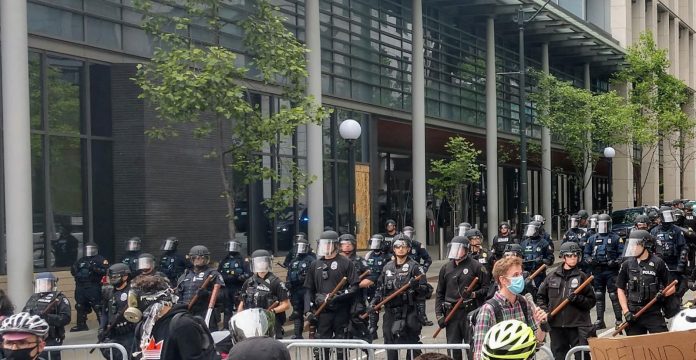Today The Urbanist joined with dozens of other independent journalists in signing a letter asking the Seattle Police Department (SPD) to drop its subpoenas of journalists. SPD’s move to compel journalists to hand over raw video footage and unpublished notes imperils our right to a free press.
To me it seems like SPD is on a giant fishing expedition in hopes of locking up a few more protesters and intimidating the rest–and journalists along with them. Without the ability to cultivate sources and build trust, journalists wouldn’t be able to tell many of the compelling stories we’ve heard during this historic summer of protests.
So far, SPD’s subpoenas have targeted The Seattle Times, KIRO 7, KING 5, KOMO 4, and KCPQ, and it’s likely more subpoenas would be in store if these news organizations do not succeed in court with their case blocking SPD’s subpoena. Journalists need to stand together, or we’ll fall together, as do people who value their work and independent voice.
Independent Journalists Letter to SPD and the City:
We are independent news organizations, editors, reporters, photojournalists, and freelancers working in Seattle, and we are coming together to oppose the Seattle Police Department’s subpoena seeking unpublished photographs and video taken by journalists at the Seattle Times, KIRO 7, KING 5, KOMO 4, and KCPQ.
This is not the Trump Administration pursuing these subpoenas. It is the Seattle Police Department, charged with serving and protecting our city. Those duties should include protecting our free press rights.
We believe that a democratic society requires a truly free press, and that the Constitution protects the rights of journalists to work independently from the power of the state. That obviously includes independence from the Seattle Police Department. Journalists cannot safely and effectively do our work if authorities can seek our unpublished notes and images as evidence. We cannot gain the trust of sources, including protest participants, if we are seen as collaborators with the police. Some of us already have been targeted with that allegation as a result of the subpoena. We cannot hold government agencies accountable if our unpublished notes and images can be scooped up and used as evidence in criminal cases.
As the Pacific Northwest Newspaper Guild wrote in a statement, “Journalists and their work product are not the agents and tools of the police.”
“We disagree in the strongest possible terms,” the Guild continued, referring to a June court decision largely in SPD’s favor. “This move by SPD and decision by Judge Nelson Lee undermines the credibility of local journalists and puts us at risk for danger.”
We stand with the Guild, the news organizations fighting the subpoenas in court and the individual journalists who may end up in an impossible position to either betray their values of journalistic integrity or face potentially serious charges.
The ongoing court case is frightening for our counterparts at these major news organizations. But it is terrifying for us, independent journalists without the financial and legal backing of a major media corporation. If SPD is successful in this case, there is no reason to think that independent journalists won’t be targeted next.
As newsrooms across our city have shuttered or shrunk, independent outlets and freelancers have become more and more vital, watchdogging government and telling a wide variety of stories about life in Seattle. Unless some business model comes along to revitalize or build large local news organizations, independent journalists will only become more important in the future.
SPD Chief Carmen Best is the person who can most easily stop this case, and we urge her to do so. There is no piece of evidence that the police might discover in journalists’ unpublished videos, photographs, notes or audio recordings that justifies this violation of fundamental press freedoms.
We also urge Chief Best, Mayor Jenny Durkan and the City Council to create clear policies to prevent another similar case in the future. Councilmember Teresa Mosqueda has introduced Resolution 31961, which calls on police to stop arresting and harming journalists during protests and urges the City Attorney to stop supporting SPD’s subpoena. That’s a good start.
But the city should also develop legally binding policies to prevent or severely restrict police subpoenas of journalists’ unpublished work in the future. At its most basic level, journalism is a two-part process: Gather information, then choose what to publish. Both of these steps are vital, and both have faced SPD attacks in recent months.
When the state starts threatening journalists, democracy itself is threatened, too.
Signed,
Erica C. Barnett, The C Is for Crank
Carolyn Bick, Freelancer, South Seattle Emerald
David Calder, Photojournalist
Justin Carder, Capitolhillseattle.com
Martin Duke, Seattle Transit Blog
Susan Fried, freelance photojournalist
Tom Fucoloro, Seattle Bike Blog
Alex Garland, freelance photojournalist and reporter
Nate Gowdy, Photojournalist
Marcus Harrison Green, South Seattle Emerald
Sarah Anne Lloyd, freelance journalist
Renee Raketty, writer/photojournalist
Tracy Record & Patrick Sand, co-publishers of West Seattle Blog
Kevin Schofield, SCC Insight
MK Scott, Unite Seattle Magazine
Doug Trumm, The Urbanist
Elizabeth Turnbull, freelance reporter
Jill Hyesun Wasberg, International Examiner
Katie Wilson, columnist at Crosscut
If you are an independent or freelance journalist working in Seattle and want to add your signature, email tom@seattlebikeblog.com.
See the an up-to-date list of signatories here.
Doug Trumm is publisher of The Urbanist. An Urbanist writer since 2015, he dreams of pedestrian streets, bus lanes, and a mass-timber building spree to end our housing crisis. He graduated from the Evans School of Public Policy and Governance at the University of Washington in 2019. He lives in Seattle's Fremont neighborhood and loves to explore the city by foot and by bike.



